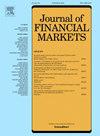投资者关注有限和对信息的偏见反应:来自新冠肺炎大流行的证据
IF 2.1
2区 经济学
Q2 BUSINESS, FINANCE
引用次数: 6
摘要
我们发现,2019冠状病毒病大流行增加(降低)了股票回报对市场范围(特定公司)新闻的敏感性,这与回报逆转(延迟反应)有关。这些结果与疫情爆发后投资者关注有限、对宏观(微观)信息关注增加(减少)的情况一致。对于总部设在流行病中心的公司和较大的股票来说,当流行病传播程度较高时,对好消息的偏见反应比坏消息更多。我们还发现,在大流行期间,与市场范围(特定公司)新闻相关的交易、信息流和价格效率更高(更低)不平衡。本文章由计算机程序翻译,如有差异,请以英文原文为准。
Limited investor attention and biased reactions to information: Evidence from the COVID-19 pandemic
We find that the COVID-19 pandemic increases (decreases) stock return sensitivity to market-wide (firm-specific) news, which is associated with return reversals (delayed reactions). These results are consistent with limited investor attention and investors paying heightened (reduced) attention to macro (micro) information after the outbreak. There are more biased reactions when the epidemic spread is higher, to good news than bad news, for firms headquartered in pandemic epicenters, and for larger stocks. We also find higher (lower) imbalanced trading, information flow, and price efficiency associated with market-wide (firm-specific) news during the pandemic.
求助全文
通过发布文献求助,成功后即可免费获取论文全文。
去求助
来源期刊

Journal of Financial Markets
BUSINESS, FINANCE-
CiteScore
3.40
自引率
3.60%
发文量
64
期刊介绍:
The Journal of Financial Markets publishes high quality original research on applied and theoretical issues related to securities trading and pricing. Area of coverage includes the analysis and design of trading mechanisms, optimal order placement strategies, the role of information in securities markets, financial intermediation as it relates to securities investments - for example, the structure of brokerage and mutual fund industries, and analyses of short and long run horizon price behaviour. The journal strives to maintain a balance between theoretical and empirical work, and aims to provide prompt and constructive reviews to paper submitters.
 求助内容:
求助内容: 应助结果提醒方式:
应助结果提醒方式:


